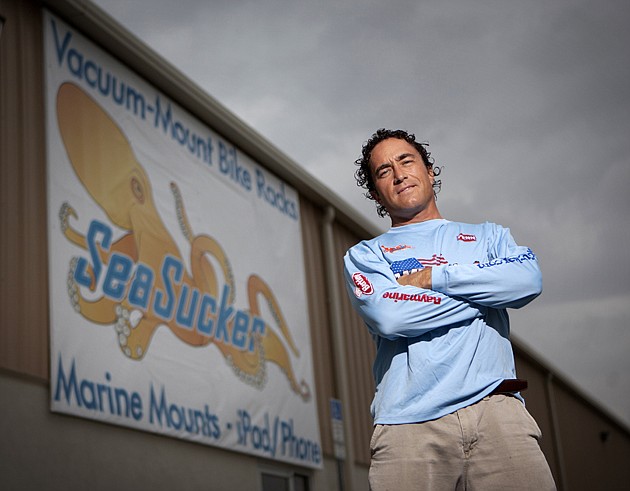- November 24, 2024
-
-
Loading

Loading

Chuck Casagrande's aha inventor moment came while fishing — not for business ideas, but for actual marlins and grouper.
That was back in 2001, when, on his 25-foot boat, Casagrande sought a seat that stuck to the floor while he and his buddies cast a line. He was surprised to discover there was nothing like what he wanted on the market. So Casagrande made his own sticky seat.
To get the chair to stay put, Casagrande combined pipes with vacuum cup technology, which is basically an advanced and stronger suction cup. Casagrande says he doesn't have an engineering mind, but he's always been the creative type. “It was pretty cool,” says Casagrande. “I thought maybe we could make something out of this.”
That's how the company, initially named Sea Chair, was born. But it's only been in the past two years, actually, when the decade-old epiphany morphed into a sustainable business, now called Sea Sucker. In fact, the Palmetto-based company has patented stick-to-it products for three distinct markets: marine, iPads and tablets and bicycles.
The last market, bike racks for cars, is where Sea Sucker has gained the most traction. That's both domestically and abroad, where it has dealer connections that have put it in dozens of foreign countries, including Australia, Israel and South Korea.
The bike rack industry is top-heavy, where companies like Thule and Allen, dominate the market. “There are a lot of bike racks out there,” says Casagrande, “but we have created a different concept. I think we are the fastest-growing bike rack company in the U.S. right now.”
Sea Sucker is run out of a 5,000-square-foot office and warehouse, where employees do some light assembly and manufacturing. The eight-employee company had $1.5 million in sales in 2012, up more than 50% over 2011. Casagrande projects sales will surpass $2 million in 2013. Employees include Casagrande's wife, Joyce Casagrande, and his brother, Greg Casagrande.
Despite the recent growth, Casagrande is often met with resistance when he goes to bike gear trade shows or even when he chats with cyclists. Defeating that skepticism is his biggest challenge. “People say 'I'm not putting my bike on a suction cup,'” says Casagrande. “But they don't understand that it's not a suction cup, it's a vacuum cup.”
Suction cups, says Casagrande, have short stickiness lives, and past that, there is no way to time when a suction cup will just give out. But the Sea Sucker vacuum cups have a built in pump that powers the suction. The pump button, further, displays a red line when air pressure begins to decrease. Then the user just needs to re-pump. Sea Sucker bike rack kits cost anywhere from $175 to $550.
On the marine side, Sea Sucker's products can be used to hold everything from fishing rods to beverages cup holders to diving gear. The same industrial vacuum cup suction technology, it turns out, can also hold an iPad to just about any surface.
Casagrande has run several other businesses prior to Sea Sucker, and he still owns a manufacturing company based in suburban Chicago. But he treats Sea Sucker like a bootstrap startup. He hasn't taken a salary yet, for example.
“We are building now,” Casagrande says. “There are sacrifices you have to make in the early stages.”